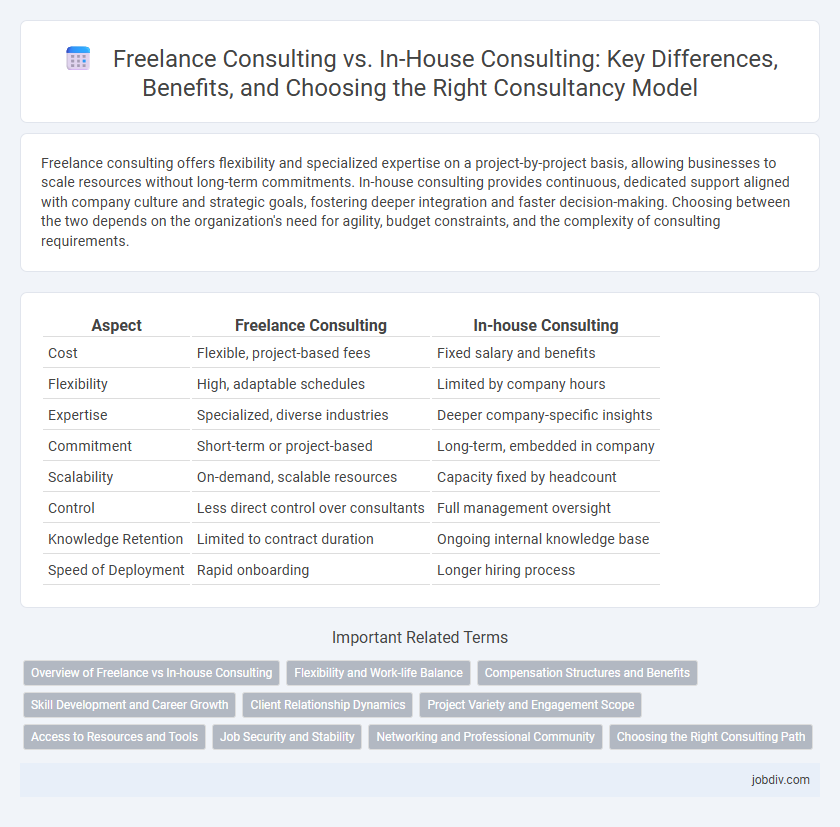Freelance consulting offers flexibility and specialized expertise on a project-by-project basis, allowing businesses to scale resources without long-term commitments. In-house consulting provides continuous, dedicated support aligned with company culture and strategic goals, fostering deeper integration and faster decision-making. Choosing between the two depends on the organization's need for agility, budget constraints, and the complexity of consulting requirements.
Table of Comparison
| Aspect | Freelance Consulting | In-house Consulting |
|---|---|---|
| Cost | Flexible, project-based fees | Fixed salary and benefits |
| Flexibility | High, adaptable schedules | Limited by company hours |
| Expertise | Specialized, diverse industries | Deeper company-specific insights |
| Commitment | Short-term or project-based | Long-term, embedded in company |
| Scalability | On-demand, scalable resources | Capacity fixed by headcount |
| Control | Less direct control over consultants | Full management oversight |
| Knowledge Retention | Limited to contract duration | Ongoing internal knowledge base |
| Speed of Deployment | Rapid onboarding | Longer hiring process |
Overview of Freelance vs In-house Consulting
Freelance consulting offers flexible project-based expertise, allowing businesses to access specialized skills without long-term commitments, while in-house consulting provides consistent, integrated support aligned with company culture and strategic goals. Freelancers bring diverse industry experience and adaptability, often resulting in cost-effective solutions, whereas in-house consultants deliver deep organizational knowledge and ongoing collaboration. Choosing between freelance and in-house consulting depends on factors like budget, project duration, need for scalability, and the importance of internal alignment.
Flexibility and Work-life Balance
Freelance consulting offers unparalleled flexibility by allowing professionals to choose projects, set schedules, and balance personal commitments more effectively than in-house roles. In-house consulting typically requires fixed hours and adherence to company policies, which can limit work-life balance and adaptability. Freelancers often benefit from remote work opportunities and diversified clients, enhancing both time management and professional growth.
Compensation Structures and Benefits
Freelance consulting typically offers variable compensation based on project scope and hourly rates, providing flexibility but lacking traditional employee benefits such as health insurance and retirement plans. In-house consultants receive a stable salary complemented by comprehensive benefits packages, including paid leave, bonuses, and career development opportunities. Companies may prefer freelancers for cost-effective, short-term expertise while valuing in-house consultants for long-term strategic alignment and organizational integration.
Skill Development and Career Growth
Freelance consulting offers diverse project exposure that accelerates skill development by requiring adaptability across various industries and challenges, fostering a versatile professional profile. In-house consulting provides structured career growth with targeted training programs, mentorship opportunities, and a clear path for advancement within a single organizational framework. Choosing between freelance and in-house consulting depends on prioritizing flexible skill acquisition versus consistent professional development and stability.
Client Relationship Dynamics
Freelance consulting offers personalized client relationship dynamics through direct communication and tailored solutions, fostering flexibility and quick adaptation to client needs. In-house consulting, embedded within the organization, benefits from deep institutional knowledge and long-term collaboration, enhancing trust and alignment with company goals. Both models require strong interpersonal skills, but freelance consultants often build relationships emphasizing agility and external perspective, while in-house consultants focus on sustained internal partnerships.
Project Variety and Engagement Scope
Freelance consulting offers exposure to diverse industries and project types, enabling consultants to develop versatile skill sets and adapt quickly to varying client needs. In-house consulting typically involves a narrower focus on a company's internal processes and long-term strategic initiatives, allowing deeper specialization but less project variety. Project variety in freelance consulting drives continuous learning and broad market insights, while in-house roles provide sustained engagement and influence within a single organizational context.
Access to Resources and Tools
Freelance consulting offers flexible access to diverse, cutting-edge resources and tools tailored to various industries, enabling consultants to stay updated with the latest technology and methodologies. In-house consulting teams typically have consistent access to proprietary company tools, internal data, and cross-departmental expertise that freelancers may lack. The choice between freelance and in-house consulting often hinges on the availability and specialization of resources necessary for the project's scope and complexity.
Job Security and Stability
Freelance consulting offers flexibility and diverse project opportunities but often lacks the job security and consistent income found in in-house consulting roles. In-house consultants benefit from stable employment contracts, employee benefits, and career progression within a single organization, enhancing long-term job stability. Companies seeking predictable advisory support typically prioritize in-house consulting for its reliability and integration with internal teams.
Networking and Professional Community
Freelance consulting offers expansive networking opportunities by connecting professionals with diverse clients and industries, fostering a dynamic professional community beyond geographic limits. In-house consulting provides deeper integration within a specific corporate network, enabling stronger relationships and collaboration within established teams. Leveraging both freelance and in-house consulting can optimize access to specialized networks and sustained professional growth.
Choosing the Right Consulting Path
Freelance consulting offers flexibility and diverse project exposure, allowing consultants to tailor their engagements and rapidly build specialized expertise. In-house consulting provides stability and deeper organizational insight, fostering long-term strategic alignment and seamless collaboration across departments. Selecting the right consulting path depends on factors such as desired work autonomy, career goals, and the need for consistent corporate integration.
Freelance Consulting vs In-house Consulting Infographic

 jobdiv.com
jobdiv.com